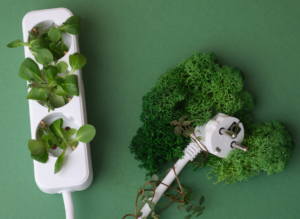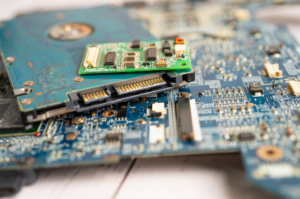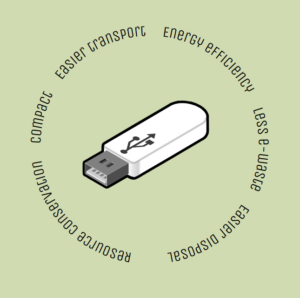In our era of rapidly advancing technology, our choices in electronic devices have a great impact on the environment, positive or negative. The world is becoming increasingly aware of the ecological consequences of their day-to-day choices, and one area where we can make a significant difference is in our choice of TV delivery methods.
Firstly, it is important to keep in mind how TV is delivered to us. Broadcast TV is when audio and video signals are transmitted over the air via terrestrial, cable or satellite networks. On the other hand, TV over Internet (IP) is sending content streams to each user via the Internet network (in unicast or multicast).
The current technologies lean towards delivery of TV over IP. But what if we look beyond the trends of ultra-connectivity for a moment? Instead of binge watching…let’s try green watching!

Broadcast provides real-time extensive coverage reaching vast geographical areas, including more rural zones. This is particularly valuable in regions with challenging terrain or limited infrastructure: no need for heavy, land-disturbing construction work and maintenance of IP infrastructure. Signals are less susceptible to local disruptions and can be transmitted regardless of natural borders – making them ideal for large-scale international broadcasting. Quality of video is also a no-brainer compared to IP which can be limited by its capacity and bandwidth. We all experienced it during the COVID time at home.
Broadcast is also 15 times less energy-intensive than content viewing via internet traffic used for TV over IP, as it avoids constant data-transmission to a set-top box (decoder) and storage through servers.
Then, why not think green when we can? And with the implementation of USB solutions, we all can!
USB is a prime example of resource conservation. Traditional set-top boxes require the manufacturing and transportation of up to 150 complex electronic components. The production of these components consumes valuable resources. In contrast, USB devices are relatively simple in design, requiring fewer materials (around 10 on average) and less energy during production. It is also a great advantage for after-sales service: if a product were to be defective, the component to be replaced would be more easily replaced. The benefits of reducing waste in manufacturing processes are clear. Similarly, the business risks surrounding pressure on rare earth minerals are well documented.
Using USB for TV offers space benefits, be it when it is distributed or at home. Carbon emissions related to transport in all industries are massive (close to a fifth of Global greenhouse gas emissions). Set-top boxes take up considerable space in transport. In contrast, USB drives, given their weight and small size, are compact enough to reduce the space needed and impact positively on reducing the means needed for transportation. Less trucks on the road, fewer trains on tracks, a smaller environmental impact.
On an individual note, using USB on TVs promotes efficient use of space, which can be particularly important in smaller or demanding environments. It is also in line with the realization that less is more and the current minimalist lifestyles.

One of the most significant ecological advantages of USB is its energy efficiency compared to set-top boxes. Set-top boxes are often left on continuously, even when not in use, which results in unnecessary energy consumption. This continuous energy usage contributes to increased greenhouse gas emissions and higher electricity bills for consumers. USB plugged into a TV consumes minimal energy – at least 10 times less than a set-top box – through the TV and does not require additional cables to an energy source.
Let us also consider how USB can limit the use of an additional remote, cutting on more manufacturing needs (materials, batteries…).
Another clear advantage of USB is the reduction of electronic waste. Set-top boxes are typically bulky devices that have a limited lifespan. Newer models are introduced at a rapid speed, leading to the disposal of older devices. These outdated set-top boxes end up in landfill. We are to produce around 74 million tons of e-waste by 2030. And that number is only set to increase as electronics become more accessible worldwide.
USB devices, on the other hand, are small, durable, and can be used repeatedly for an extended period, significantly reducing the generation of electronic waste.
When it comes to disposing of electronic devices, USB devices offer a more straightforward and environmentally friendly option. Due to their small size and simpler construction, recycling USB devices is easier than recycling set-top boxes. Many recycling centres accept USB devices for proper disposal, ensuring that valuable materials can be recovered and reused. This reduces the strain on natural resources and minimizes the environmental damage associated with extracting and processing raw materials for new electronic devices.
Knowing we only recycle 10% of our e-waste, spreading awareness about the end-life of manufactured products is crucial.

In conclusion, the ecological advantages of using USB devices instead of set-top boxes for TV are clear and compelling. Thinking green is wise for all actors involved.
Twise is first in line: our driving force is our capacity to offer greener TV viewing. Our work enables a local production, close to end users. We are proud to ease the production of small USB devices in specific regions of the world and even more so with complex geopolitical issues.
Manufacturers, operators and consumers, we all must consider the environmental impact of our choices and opting for USB solutions for TV is a small yet significant step toward a more sustainable future.
For more information : contact@twise.fr



